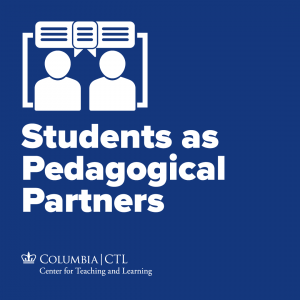Learner Perspectives on AI Tools: Digital Literacy, Academic Integrity, and Student Engagement
In Spring 2023, with the rising attention surrounding the use of ChatGPT and other artificial intelligence (AI) tools in higher education, we asked our four undergraduate student consultants from the CTL’s Students as Pedagogical Partners Initiative for their perspectives. In the following, they share their thoughts on AI tools in relation to digital literacy skills, instructor-student dialogue on academic integrity, pedagogical use of AI tools, and assignment design.
Leverage AI tools to help students develop digital literacy skills.

“There seems to be this underlying belief that AI compromises the difficulty of an assignment and therefore compromises its rigor. However, I think we should challenge the belief that difficulty equals rigor. AI tools can be helpful in expediting the research process of an assignment, allowing students to spend more time engaging with critical thinking. If anything, AI could increase rigor, even if it makes an assignment less difficult and time consuming.” – Emily Glover | Columbia College
Create space for student-instructor dialogue on academic integrity.

“In today’s AI-driven climate, what does academic integrity mean? I think it’s essential that students and instructors partake in a meaningful dialogue about how we approach these tools in a way that doesn’t compromise academic integrity. That said, it may be worth revisiting how we articulate these expectations with the growing prevalence of different AI platforms to eliminate any ambiguity both students and instructors may have.” – Kyle Gordon | General Studies
Incorporate AI tools into class assignments in a structured way.

“A human layer is always necessary for original and authentic work. Faculty could create assignments designed to use ChatGPT for feedback and suggestions on students’ work. An initial draft would be created by students, then run through ChatGPT, and then revised and re-worked by students. They would need to reflect on the ChatGPT version and their own previous work: did the experience foster any new thoughts/ideas in students based on the ChatGPT version? This would also give students the opportunity to make decisions most beneficial to their learning.” – Jesper Norgaard | General Studies
Increase student motivation and engagement with authentic assignment design.

“As technology advances, faculty and students are continually given access to new tools that can change their approach to education. With that said, assignments that are designed to create student engagement and motivation will be most influential in learning, regardless of whether or not professors utilize AI.” – Olivia Schmitt | School of Engineering and Applied Science
Do you have any follow-up questions for our undergraduate student partners on their thoughts on AI tools? We invite you to submit your questions through this link. The CTL’s student partners will respond to you with their insights and experiences.
Looking for additional considerations for navigating the use of AI tools in the classroom? Read the CTL Resource: Considerations for AI Tools in the Classroom.
